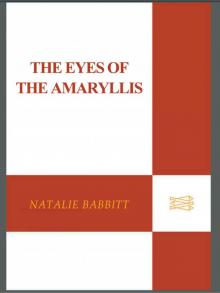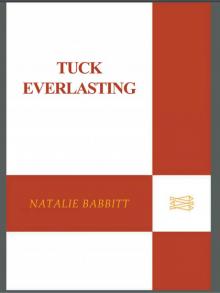- Home
- Natalie Babbitt
The Moon Over High Street
The Moon Over High Street Read online
FOR MICHAEL DI CAPUA
ITERUM:
SINE QUO NON
CONTENTS
TITLE PAGE
DEDICATION
I
II
III
IV
V
VI
VII
VIII
IX
X
XI
EPILOGUE
BOOKS BY NATALIE BABBITT
ABOUT THE AUTHOR
COPYRIGHT
I
THIS IS JOE CASIMIR’S story. But if you’re going to understand what happened when he got on a bus and came down southwest across the state to visit a town called Midville, you have to know about Mr. Boulderwall.
Mr. Boulderwall was very important in Midville. He’d lived there for a long time—long enough to grow from a watchful little boy, newly arrived from a village in faraway Poland, into a man with a head full of plans. And he made those plans come true. He did it all with his invention of a thing called a “swervit,” a thing to be used in engines. It’s hard to say where he learned so much about engines, but never mind that. The important thing is that swervits started out unknown, like Mr. Boulderwall himself, and after ten or fifteen years, they were a necessary part of every car, bus, and truck in America. And they made Mr. Boulderwall rich. Very rich. In fact, he was worth millions.
When you’re as rich as that, you can afford to live on the best street in town. Every town has a best street. Everything on it is big and beautiful: the houses, the gardens, the trees, even the grass—wide, sweeping lawns of grass, not just patches. Here in America, we like things to be big and beautiful. That’s the way the land was in the beginning. That’s the way it still is.
Midville’s best street was High Street. It was up on a hill. Not much of a hill, to tell the truth, but in that part of the state, the flat south-central part, hills are not taken for granted. Everything on High Street was big, especially the trees. There were a lot of trees, and they were big and very beautiful indeed. But in spite of all that beauty they were like most other trees: In the fall, they dropped their leaves all over everything, making a deep, dry rustle of a mess that had to be raked again and again. They didn’t care, and why should they? They had their own rules, after all. And anyway, a few of them were so old they’d been on that hill before there even was a High Street. Trees don’t pay attention to streets. But people do.
Here’s the reason why: In America, we like to think we’ll own a piece of land someday, maybe even a piece on a street like High Street. If you own a piece of land, you belong. Belonging is good, and belonging to what’s big and beautiful is about as good as it gets. At least, that’s what most of us believe. So we wait and watch and try to find out how to make it happen. Because it does happen, all the time, to lots of other people, in lots of other ways besides swervits. So why not make it happen to us? It’s all in the knowing how.
There was a lot to learn if you were watching Anson Boulderwall. And by the way, that wasn’t the name he was born with. When he was born, in Poland, he was christened Anselm Boldivol. But his mother and father took him away from Poland to escape the endless wars in that part of the world, and they came across the wide Atlantic Ocean, like many thousands of others, to America—where they would be safe. And when he arrived, the first thing he had to do was be taken off the ship at a place called Ellis Island, with everyone else, where he could be weighed and measured. Well, maybe he wasn’t exactly weighed and measured, but he was certainly looked at, up, down, and sideways, before they let him come in and be a citizen.
But the people in charge on Ellis Island didn’t always pay attention to names. Or maybe they were just so busy looking you over they didn’t really listen when you told them who you were. To them, Anselm sounded like Anson, and Boldivol sounded like Boulderwall. They wrote it down like that, and that’s the way it stayed.
So now, here he was, a long time later, living on High Street with his wife, Ruthetta. She had married him when he was only beginning on the making of swervits; he wasn’t rich yet. But Ruthetta—well, let’s just say she had a knack for seeing into the future, and for getting what she wanted. When swervits took off in the world of engines and the money was flowing in, she urged and won the move to High Street, and she put all her waiting and watching to the best possible use. She made a few small changes in herself—not unlike the changes a rosebush makes between December and June—and she arranged it so that their only child, a girl they named Ivy, had the necessary extras to guarantee a stylish life: the right schools, the right clothes, piano lessons, and a pony. It worked. Ivy grew up to marry a man who had plenty of money of his own. However, though he didn’t object to the fact that Ivy would inherit the Boulderwall fortune someday, he had no interest at all in swervits.
So, what would Mr. Boulderwall do with the factory when he got too old to run it himself? Sell it out of the family? To a stranger? Certainly not! It was much too close to his heart. But if not that, then what? The question was always in the back of his mind, and sometimes it even took over the front. That’s where it was on the very day when Joe Casimir came to Midville. For it was Mr. Boulderwall’s birthday, and he was seventy-one years old and worried about the future. Life always seems to have worries, even if you own a big and beautiful house on the best street in town.
II
JOE CASIMIR WAS NOT in a big and beautiful house on Mr. Boulderwall’s birthday. He was on a bus, where he very much didn’t want to be. An airplane would have been all right, maybe, but forget about that. Most likely, Midville didn’t have an airport, and even if it did, flying cost too much. No, things were the way they had to be, and that was that. Whether he liked it or not, he had to go to Midville to stay with Aunt Myra, he had to go alone, and he had to take the bus.
The trip itself was no surprise. His grandmother—he called her Gran—had planned it for June when school was out. And about time, too, she said. Families should stick together. But she and Joe had only been down to Midville once, and that was years ago. No excuse, she said, when there were just the three of them left. Joe’s mother and father had been killed in a car crash when he was no more than a few months old, so he’d always lived with Gran. And his other grandparents—they were gone, too, with him the single grandchild. So this was all that was left of the Casimir family: Gran and Joe and—Aunt Myra.
Aunt Myra wasn’t really his aunt. She wasn’t anybody’s aunt. But she was a cousin of his father’s—the same age as his father—so Joe couldn’t call her just plain Myra. His grandmother disapproved of young people calling older ones by their first names. However, calling her Aunt Myra—that seemed to be all right. Funny how sometimes things were all right even when they were wrong.
Aunt Myra wasn’t married, but she had a busy life in Midville, teaching at some school or other. She’d only come twice to visit them in Willowick—Willowick up north on the edge of Lake Erie, where Joe and his grandmother lived. But Gran said early in the spring, “Joe, if we don’t take a trip down to Midville this summer, we’ll never get there at all. You’re growing up too fast.”
Joe had learned long since that if his grandmother wanted things to go a certain way, that’s the way they went. Most of the time, this was not a problem. Joe and Gran got along together very well, considering the fact that she was sixty-three years older than he was. They liked to please each other. Still, sometimes he had a certain strong feeling—an irritated feeling—a feeling of having no control over what was going on. He was having that feeling now, on the bus. He found himself wondering why he always had to do what other people wanted. Why should he care about Aunt Myra when he hardly even knew her? But Gran said they had to go to Midville and visit
her, so, well, that was that. They had to go to Midville and visit her. June had arrived at last, school was over for the summer, the day for the trip loomed up, and then—this awful thing had happened: Gran was climbing the attic stairs to get a suitcase when she slipped and fell and broke her hip.
Gran wasn’t a sissy. She faced up to things the way they were. One of her friends, a widow named Helen Mello, offered to take charge of Joe while the doctors were taking charge of her, and for a couple of days she was in no shape for visitors and talking. But after that, when he came to see her: “Joe,” she had said in her always sensible voice, “I’m just as sorry as I can be, but you’re going to have to go down to Midville by yourself and stay with Aunt Myra while I get over this. I’m going to be perfectly fine, but the doctor says I’ll need to be in a recovery sort of place—a rehab center, I think he called it. Anyway, it’s special exercises. I’ll have to be there for at least a week, Joe, until I get going again, and there’s nowhere else to put you! Unless you want to stay where you are? With Mrs. Mello? No, I didn’t think so. But we were going to Midville anyway, after all. I talked to Myra on the phone a couple of hours ago, and she says she really wants to have you there. Then, when I can get around again, I’ll go down myself for a few days, and we can come back home together. How does that sound?”
He had told her it sounded all right. It didn’t, of course, but if she could face up to things without a fuss, so could he. He spent another night with Mrs. Mello—in a guest room that was mostly ruffles—and in the morning, after breakfast, she made him a peanut-butter sandwich for his lunch and helped him close up his suitcase. And then she took him to the bus station. It was very nice of her, of course, but she made a fuss and she chirped, like a sparrow at Gran’s old bird feeder. She made a fuss, she chirped, and she kept patting him. And the worst part was, she insisted on pinning a label to the pocket of his shirt, explaining him to the world: JOSEPH CASIMIR—TO MIDVILLE—WILL BE MET BY MISS MYRA CASIMIR. “There now!” she chirped, patting him one last time. “You’ll have a dandy trip! And when you’re on your way, I’ll go tell your sweetie of a grandma what a fine, plucky lad you are!” Joe didn’t like being called a fine, plucky lad, but he didn’t say so. He just swallowed around his irritation, bobbed his head to mean goodbye, and climbed aboard the bus.
Alone at last, he had chosen his seat with care—all the way to the back, and no one to share it. He made sure of that by putting the paper bag with his lunch in it on the seat nearest the aisle. It was a pink paper bag with big white daisies printed on it, exactly the kind of paper bag someone like Mrs. Mello would collect. Under any other circumstances, he’d have hidden it. But now, well, at least people would notice it and not try to sit down next to him. And then, when the bus had left the station, groaning past the eye of Mrs. Mello, he took the label off his pocket, tore it up into very small pieces, and stuffed it into an ashtray in the armrest.
And now he was settling himself for the long angle down southwest across the state with five or six hours ahead of him for thinking. Mostly it was good to have time alone for thinking, but there were questions he couldn’t answer, questions that were taking up room in his head and wouldn’t go away. What would it be like in Midville? No school, at least, but without it, how could he find someone to talk to? Or was he just supposed to sit in Aunt Myra’s living room and stare at the television? And what would Aunt Myra be like? He hadn’t seen her for a long, long time. He didn’t remember ever seeing her. If there were a lot of people waiting to meet the bus, how would he know which one she was? How would she know him?
He wondered, too, about his friends back in Willowick. What would they be doing while he was gone? Would they wish he was still around? Or would they just yawn and go ahead with summer? Emily Crouse … but he decided to try and put her out of his mind. He could get along without Emily Crouse. Of course he could. But he found himself hoping she’d notice he was gone.
And then he told himself it was dumb to think about things like that. After all, he’d be going back pretty soon. But it seemed as if what was happening now must be what it felt like to go away forever. There was this blank stretch of time, with the old place left behind, when you might as well be no one. You’ve been someone, with people all around who know you, but then you up and leave, and the old place disappears as if it never had been real to begin with. You leave it, and while you’re on your way, you feel as if you’re disappearing, too. But he didn’t have to feel like that. He was only going off for a little while. Gran would be okay, and he’d go back to living in Willowick.
He sighed and peered out the window beside him, but there wasn’t much to look at. Here, in the country, the land was big, yes, but it certainly wasn’t beautiful. Too many tired old farms and scratchy fields cluttering up the view, too many dinky little towns. Behind him, when he looked out the back window, there were only the usual cars and trucks rushing along the highway, once in a while a motorcycle, everyone in a hurry, impatient, wanting to pass the bus.
As well as he could, he craned his neck and squinted upward. Nothing in the sky overhead, as much as he could see of it. Just ordinary clouds and sunshine. He sighed again and wished with all his heart that it was nighttime. There were always good things to look at then, up there, things that magically eased him of the irritated feeling. And someday, when he was on his own—well, but never mind that now. Someday was a long way off. Tonight was not a long way off. And Midville would have a night sky; that much was certain. But first he had to get there.
He settled deeper into his seat, and now and then he almost went to sleep. Outside the window, more of the same farms and fields and little towns. Once in a while a city with stops to let passengers off, passengers on. He didn’t want to look at the passengers. He’d brought along a couple of books, and pretended to be busy reading, but really reading on a bus, a bus that swayed—no, not a good idea. He ate the peanut-butter sandwich and finished off the bottle of ginger ale. He tried to play that alphabet game where you had to find all the letters, capital letters, in order from A to Z, on the billboards and signs beside the highway, but finally it only made him even more irritated. Most of the letters on the way to Q were easy to spot, but you’d think there was some kind of law against using a Q word on a billboard. After half an hour, he gave it up.
More long gray miles of fields and shabby farms, another tiresome stretch of trying not to think. And then, all at once, the driver called out: “Next stop, Midville! Midville next!” Joe sat up, suddenly a little breathless, suddenly alert. He lifted his suitcase onto his lap, keeping a grip on the handle. “Maybe it won’t be so bad,” he told himself. “Not too bad, anyway.” He sat erect and looked out the window, really looked this time, to see what it was like. Simple little houses, strewn wide apart, then a railroad track, a bridge across a narrow river. Warehouses, storage tanks, factories tucked behind chain-link fences. More railroad tracks. Then a much bigger factory, with tidy trucks lined up, and a big, tidy sign on its roof: SWERVIT, INC. Now all of this giving way to fancier buildings—offices, department stores, restaurants. Friday afternoon sidewalks full of shoppers. The bus growled into a station and lurched to a stop. The driver stood up, rubbing his shoulders. And then he turned and called, “Okay, kid, this is you.”
The aisle was suddenly full of passengers gathering packages and magazines and every kind of luggage, making a bustle. Joe struggled out of the safety of his seat, his own suitcase hanging heavy from his grip. He waited till the aisle was clear and then, slowly, abandoning the pink paper bag, he went to the open door. His heart was pounding and his face was hot, for all at once he felt like something ordered through the mail that might turn out to be wrong. He climbed down the tall pair of steps and stood on concrete, bewildered. Late afternoon sunshine burned on his head, the push of people made him blink. He set his suitcase at his feet and rubbed his nose. “What if no one comes?” he wondered vaguely.
And then, hurrying toward him, he saw a tall woman with a broad, b
eaming face. “Joe!” she cried, waving an arm. “Here I am, Joe!” And he found himself wrapped close in an ample, warm embrace. “Joe,” said the voice in his ear, softly now, “I’m Myra. Welcome, Joe. I’m so glad you’re here!”
III
“HERE WE GO,” said Aunt Myra. “This way. My car’s right over there. So—how was your trip?”
“It was okay,” said Joe, trying not to lose her on the crowded sidewalk.
“A long time to sit on a bus, though,” she said. “Well, never mind. It’s over now. You don’t remember much about this place, do you? You were only two or three last time you came.”
“I guess,” said Joe. And then he waited, expecting her to tell him what a cute little boy he’d been.
But, wonder of wonders, she didn’t. “You’ll learn your way around in no time” was all she said. “It’s simple.” And then: “Here we are.” She dumped his suitcase into the trunk of her little black Ford, and then they were off, down streets, around corners, all a blur for Joe. Downtown gave way to streets for people. Yards with trees. A square brick building with a flagpole in front: “That’s the school where I teach,” she told him. “Lincoln School.” Around another corner, past more houses. A little grocery store. And then, suddenly, a park! Bigger trees. A slide—and swings and seesaws. A baseball diamond. And a bandstand! An honest-to-goodness bandstand! Not too bad, all that. Around a final corner, up a second block, and “Here we are! Number 24 Glen Lane.” They bounced into the driveway and Joe found himself in front of a small clapboard house that was not so different from his grandmother’s—a friendly little two-story house with a porch across the front and what might be a pretty good yard out back. It looked as if—well, as if it wouldn’t want much from him. As if it would take him as he was. And he let out a long breath.

 The Eyes of the Amaryllis
The Eyes of the Amaryllis Herbert Rowbarge
Herbert Rowbarge The Search for Delicious
The Search for Delicious Kneeknock Rise
Kneeknock Rise Goody Hall
Goody Hall Tuck Everlasting
Tuck Everlasting The Devil's Storybook
The Devil's Storybook The Moon Over High Street
The Moon Over High Street Phoebe's Revolt
Phoebe's Revolt Barking with the Big Dogs
Barking with the Big Dogs The Devil's Storybooks
The Devil's Storybooks